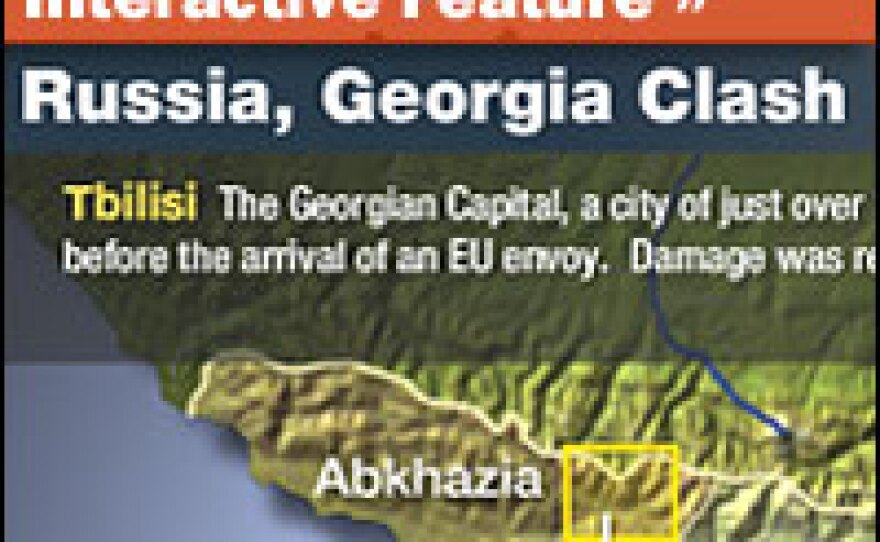
Russian troops still have not made any significant move to withdraw from the Georgian territory, three days after Russian President Dmitry Medvedev signed a French-brokered cease-fire agreement with Georgia.
A growing number of Western leaders are demanding that Russian soldiers abandon Georgia immediately.
But Russia's slow punishment of its disobedient little neighbor continued Monday.
Bridge Mysteriously Bombed
Russian troops blockaded Georgia's main east-west highway. Meanwhile, Georgian repair crews were hard at work trying to fix a railroad bridge, which was mysteriously bombed on Saturday.
Moscow denied responsibility for the blast, which blew out a 20-foot span of the concrete and steel bridge.
With this last remaining land link between Tbilisi and the western half of the country severed, the only way to travel from the Georgian capital to western Georgia is by military helicopter. On a recent flight, the chopper skimmed low, sometimes less than 20 feet, over trees and haystacks and through deep mountain gorges.
At the entrance to the western town of Zugdidi, someone had spray-painted "Russians go home" next to a swastika.
Russian troops have occupied several Georgian military installations and police barracks, and they have set up a battery of artillery in an open field outside town.
An elderly Georgian man named Boris walked past several Russian soldiers who were relaxing in the shade.
"We need to make sure not a single hair on their heads gets hurt," Boris said. "If even one Russian soldier dies, then Russia will punish us even more."
A Defenseless Georgian Base
In the nearby town of Senaki, Russian troops have occupied what had been one of the biggest Georgian military bases in the area.
An American-trained Georgian army officer named Lt. Ramazi Aphkhadze stood outside the main gate of what had been his barracks, dressed in civilian clothes.
When the war with Russia broke out, Aphkhadze said the base was practically defenseless.
"All of our guys was in South Ossetia; we was only about 200 soldiers here," he said. "And we could not fight with them."
On Aug. 8, the Georgian army tried — and failed — to capture the Russian-backed breakaway region of South Ossetia during a surprise offensive.
Russia: Georgia Cannot Be Forgiven
Russia's president said Monday that Georgia can not be forgiven or left unpunished for this attack.
At the Senaki army base, Aphkhadze could do little more then watch as Russian soldiers destroyed his army's equipment.
Russian troops have also been hard at work destroying the Georgian coast guard base in the Black Sea port of Poti. The radio antennas of several sunken coast guard vessels stick out of the water. A nearby administrative building was completely ransacked. Insulation was even ripped out of the ceilings.
The nearby civilian port was also hit during the fighting.
"The port was bombed. And several people died, as you know. And even one of my friends, he was injured," said Samira Kuznetsova, an ethnic Russian and Georgian citizen.
Kuznetsova published a blog with her firsthand account of the Russian bombing.
"And for me it's terrible, actually, because I have a lot of friends in Russia, and they don't believe me," she said. "They don't understand what is happening. They say that this is fake — it couldn't be true. That's why there are a lot of problems. It will be a lot of problems between two nations in the future."
Copyright 2022 NPR. To see more, visit https://www.npr.org. 9(MDAzMjM2NDYzMDEyMzc1Njk5NjAxNzY3OQ001))







